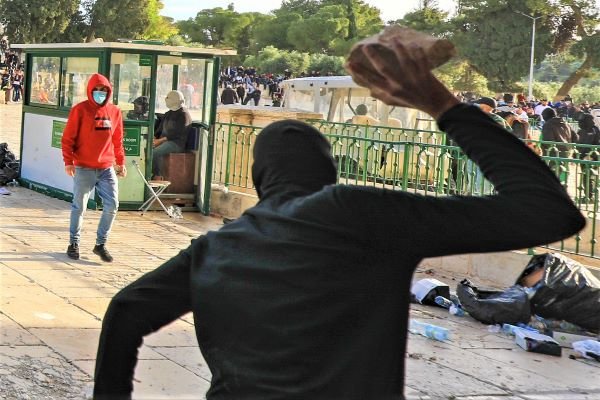
Tor Wennesland stressed that Israeli police only entered the Al Aqsa Mosque after the rioting Palestinians “barricaded” themselves inside.
The UN’s top Mideast envoy corroborated Israel’s account of recent Temple Mount violence during a briefing for the UN Security Council on Monday.
“On 15 April, during the early morning hours, a large number of Palestinians gathered at the Al Aqsa compound. Some Palestinians threw stones, fireworks and other heavy objects toward Israeli Security Forces,” said UN Special Coordinator for the Middle East Peace Process Tor Wennesland.
He added that “several dozen Palestinians entered a mosque in the compound, with some continuing to throw stones and fireworks toward ISF. Following a standoff with those inside, Israeli police entered the mosque and arrested those barricaded inside. During the clashes, some damage was caused to the structure of the mosque.”
The Norwegian diplomat substantiated Israel’s account of the violence by stressing that Israeli forces only entered the Al Aqsa Mosque after the rioting Palestinians had “barricaded” themselves inside.
And in a rare acknowledgement by any international diplomat, Wennesland also praised Israeli officials for “reiterating [their] commitment to upholding the status quo and ensuring that only Muslims would be allowed to pray on the holy esplanade.”
The clashes broke out on Friday morning on the eve of Passover. The Temple Mount was more crowded than usual because of Ramadan. When the dawn prayers ended around 6:30 a.m., hundreds of Palestinian youths began throwing rocks and fireworks at Jewish worshipers at the Western Wall.
Many waved Hamas flags and chanted
“death to the Jews.”
They then barricaded themselves inside the Al Aqsa Mosque, where they threw rocks and fireworks at police who had entered the area in response to the violence.
Police at first did not enter the mosque, but eventually were forced to do so to quell the violence, which they endangered the public.
Tensions over the Temple Mount skyrocketed this month, corresponding to an annual uptick in violence that occurs during Ramadan each year. According to a Dutch study cited by the Jerusalem Post, “Ramadan brought with it a 200% increase in terrorist attacks in Israel between 2005 and 2016.”
The Temple Mount, where the First and Second Temples were built, is the holiest site in Judaism. The delicate status quo governing the Temple Mount goes back to 1967, when Israel liberated the the Old City of Jerusalem from Jordan during the Six Day War.
(United with Israel).